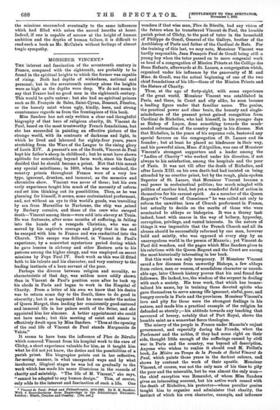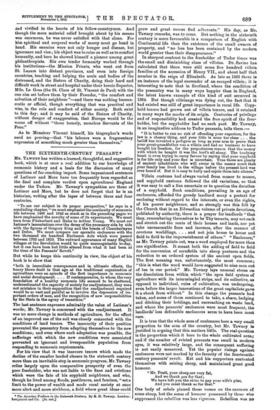MONSIEUR VINCENT.*
THE interest and fascination of the seventeenth century in France, compared with the eighteenth, are probably to be found in the spiritual heights to which the former was capable of rising. Both had depths of wickedness, national and personal ; but in the seventeenth century alone the heights were as high as the depths were deep. We do not mean to say that France had no good men in the eighteenth century. This would be quite untrue : but she had no spiritual princes such as St. Francois de Sales, Saint-Cyran, Bossuet, Fenelon, or the homely saint whose ugly, kindly, keen, and strong countenance regards us from the frontispiece of this book.
Miss Sanders has not only written a clear and thoughtful biography of that hero of religions charity, St. Vincent de Paul, based on the most trustworthy French foundations, but she has succeeded in painting an effective picture of the strange world, with its contrasts of darkness and light, in which he lived and laboured for eighty-four years, years stretching from the Wars of the League to the rising glory of Louis xrv. A peasant's son of the South, Vincent de Paul kept his father's sheep in childhood ; but he must have shown aptitude for something beyond farm work, since his family decided that he should become a priest. Not that this meant any special saintliness ; in 1600, when he was ordained, the country priests throughout France were of a very low type, ignorant, drunken, and immoral, as the memoirs and chronicles show. Vincent was never of these; but his own early experience taught him much of the necessity of reform and set him thinking out its possibilities. Then, as he was planning for himself, it seems, some ecclesiastical preferment, and, not without an eye to this world's goods, was travelling by sea from Marseilles to Narbonne, the ship was seized by Barbary corsairs, and those of the crew who escaped death—Vincent among them—were sold into slavery at Tunis. He was fortunate, after some months of suffering, in falling into the hands of a renegade Christian, who was so moved by his captive's courage and piety that in the end he escaped with him to France and was readmitted into the Church. This escape was followed, in Vincent de Paul's experience, by a somewhat mysterious period during which he gave lessons in alchemy and other Eastern arts to his patrons among the higher clergy, and was employed on secret missions by Pope Paul IV. Such work as this was ill fitted both to his talents and his character, and very contrary to the leading instincts of a born servant of the poor.
Perhaps the divorce between 'religion and morality, so characteristic of that day, was seldom more oddly shown than in Vincent de Paul's position soon after he took up his abode in Paris and began to work in the Hospital of Charity. From a letter of his own we know that his desire was to return some day to the South, there to do good in obscurity ; but it so happened that he came under the notice of Queen Margot, then leading her consistently good-natured and immoral life in her palace south of the Seine, and she appointed him her almoner. A better appointment she could not have made ; but this meeting of saint and sinner is effectively dwelt upon by Miss Sanders. "Thus at the opening of the real life of Vincent de Paul stands Marguerite de Valois."
It seems to have been the influence of Pe,re de Berulle which removed Vincent from his hospital work to the cure of Clichy, a short experience valuable for him, as it taught him what he did not yet know, the duties and the possibilities of a parish priest. His biographer points out in her reflective, far-seeing manner, in what unexpected ways and by what incoherent, illogical stages he was led on gradually to the work which has made his name illustrious in the records of charity and saintship. "The life of M. Vincent," she says, "cannot be adapted to any human design." This, of course, only adds to the interest and fascination of such a life. One
• Vincent de Paul: Priest and Philanthropist, 1576-1660. By E. H. Sanders. 'With 8 Reproductions from Engravings in the Bibliotheque Nationale. London : Heath, Cranton and Ouseley. [16s. net.]
wonders if that wise man, Pere de Berulle, had any vision of the future when he transferred Vincent de Paul, the humble parish priest of Clichy, to the post of tutor in the household of Philippe de Gondi, General of the Galleys, brother of the Archbishop of Paris and father of the Cardinal de Retz. For the training of this last, we may note, Monsieur Vincent was hardly responsible, Jean Francois Paul de Gondi being still a young boy when the tutor passed on to more congenial work as head of a congregation of Mission Priests at the College des Bons Enfants, afterwards at St. Lazare, a congregation which, organized under his influence by the generosity of M. and Mine. de Gondi, was the actual beginning of one of the two chief foundations of his life—those of the Mission Priests and the Sisters of Charity.
Thus, at the age of forty-eight, with some experience of the great world, Monsieur 'Vincent was established in Paris, and there, in Court and city alike, he soon became a leading figure under that familiar name. The genius, the practical power and clear brain, the honesty and single- mindedness of the peasant priest gained recognition from Cardinal de Richelieu, who had himself, in his younger days as Bishop of Lucon, done something towards the much- needed reformation of the country clergy in his diocese. Not that Richelieu, in the years of his supreme rule, bestowed any special favours on the congregation of St. Lazare and its founder ; but at least he placed no hindrance in their way, and his powerful niece, Mme. d'Aiguillon, was one of Monsieur Vincent's strongest supporters and a leader among the "Ladies of Charity" who worked under his direction, if not always to his satisfaction, among the hospitals and the poor of Paris. It was not till after the death of Richelieu, and after Louis %La on his own death-bed had insisted on being attended by no courtier priest, but by the rough, plain-spoken Superior of St. Lazare, that Monsieur Vincent became a real power in ecclesiastical politics ; too much mingled with politics of another kind, but yet a wonderful field of action in themselves for his earnest spirit. As a member of the Queen Regent's "Council of Conscience" he was called not only to reform the unwritten laws of Church preferment in France, but actually to decide on the merits of those who were nominated to abbeys or bishoprics. It was a thorny task indeed, beset with snares in the way of bribery, hypocrisy, corruption, privilege, and vested interests. In the nature of things it was impossible that the French Church and all its abuses should be successfully reformed by one man, however bold and saintly, who was opposed at every step by an unscrupulous world in the person of Mazarin ; yet Vincent de Paul did wonders, and the pages which Miss Sanders gives to his relations with the Queen Regent and the Court are among the most historically interesting in her book.
But this work was only temporary. If Monsieur Vincent saved a few dioceses from unworthy Bishops, a few abbeys from rulers, men or women, of scandalous character or unsuit- able age, later Church history proves that his zeal found few followers. He lacked, too, the wisdom of the serpent in dealing with such a society. His true work, that which has immor- talized his name, lay in training those devoted spirits who gave themselves to serve among tge ignorant, sinful, poor, and hungry crowds in Paris and the provinces. Monsieur Vincent's love and pity for these were the strongest feelings in his nature, and made him a practical example of the religion he defended so sternly ;—his attitude towards any teaching that savoured of heresy, notably that of Port Royal, shows the humble saint as a somewhat fierce theologian.
The misery of the people in France under Mazarin's unjust government, and especially during the Fronde, when the Parlement and the nobles, if they had some right on their side, thought little enough of the sufferings caused by civil war in Paris and the country, was beyond all description. Anyone who wishes to realize it should read K Feillet's book, La 3fisere au Temps de la Fronde et Saint Vincent de Paul, which paints those years in the darkest colours, and shows by contrast the work of their apostle. Monsieur Vincent, of course, was not the only man of his time to pity the poor and the miserable, but he was almost the only man— the chief exception was Renaudot, of whom Miss Sanders gives an interesting account, but his active work ceased with the death of Richelieu, his protector—whose peculiar genius taught him to organize and administer that charity, the instinct of which his own character, example, and influence
.1ad vivified in the hearts of his fellow-countrymen. And though the mere material relief brought about by his means was enormous, he was never satisfied with that alone. For him spiritual and corporal works of mercy must go hand in hand. His enemies were not only hunger and disease, but ignorance and vice ; his object was to raise as well as to comfort humanity, and here he showed himself a pioneer among great philanthropists. His own tender humanity worked through his institutions—the Mission Priests, who went out from St. Lazare into distant provinces, and even into foreign countries, teaching and helping the souls and bodies of the distressed, and the Sisters of Charity, doing their hard and difficult work in street and hospital under their heroic Superior, Mlle. Le Gras (the St. Clare of St. Vincent de Paul) with the one aim set before them by their Founder, "the comfort and salvation of their neighbour "—and there was nothing bureau- cratic or official, though everything that was practical and wise, in the rule and conduct of either society. Both exist to this day; and it may be said of the Sisters of Charity, without danger of exaggeration, that Europe would be the worse off without "those homely, nameless Servants of the Poor."
As to Monsieur Vincent himself, his biographer's words need no proving—that "his labours were a fragmentary expression of something much greater than themselves."































































 Previous page
Previous page